KATHMANDU: Nobel Prize winner Mikhail Sholokhov’s story, ‘Fate of a Man,’ published in 1956, echoes the tale of a Russian patriot held captive by Hitler’s forces and later returning home.”
A parallel narrative unfolds as a former Nepali policeman turned mercenary, operating under the alias Mr. Chhetri (real name withheld for security reasons), manages a daring escape from the clutches of the Russian Army, shedding light on the mysterious world of Nepali involvement in foreign conflicts.
This poignant account unveils the odyssey of Mr. Chhetri from the hills of Gulmi to the battlefields of Ukraine, implicating not only the Russian military’s questionable practices but also the covert operations of Nepali brokers in Moscow.
Unmasking the Shadows: Nepali Involvement in the Russian Army
Mr. Chhetri, a Gulmi native and former Nepali Army member-turned-armed police, embarked on an unexpected journey to Russia with his brother just two months ago.
Motivation arose from a questionable opportunity put forth by manpower agencies, offering potential employment in the Russian Army. These prospects come with appealing compensation structures, positioned as an alternative to opportunities in Gulf countries where the average salary ranges from Rs 20,000 to 40,000.
Raising eyebrows about the legitimacy of the war in Ukraine, Mr. Chhetri accuses Russia of deploying mercenaries and adopting inhumane methods, setting the stage for a riveting exposé on the circumstances faced by Nepalese enlisted in the Russian army.
From Kathmandu to Rostov: A Twisted Journey
Mr. Chhetri narrates the perilous path that led him and his brother to Russia.
Seeking lucrative prospects, they disregarded advice and joined the Russian Army independently.
The journey began in mid-September, with a meticulous process culminating in their departure from Kathmandu’s Tribhuvan Airport on October 17.
The account details the intricate procedures, visa approvals, and the complicity of the Nepali manpower agencies in orchestrating the venture.
Eight Nepalis, including the Chhetri brothers, embarked on the journey, facilitated by the same agencies that brokered the deal.
Betrayal in Sharjah: Nepali Brokers’ Intrigue Revealed
However, the plot thickens during a layover in Sharjah, UAE, where Nepali brokers connected to Moscow coerced the group into a suspicious act.
In a shocking revelation, Mr. Chhetri discloses that they were compelled to format their mobile phones, a move suggesting a sinister agenda beyond the battlefield.
Mr. Chhetri’s harrowing escape, fraught with danger and sacrifice, highlights the dark underbelly of the nexus between Nepali recruits, Russian military engagements, and clandestine operations conducted by brokers in Moscow.
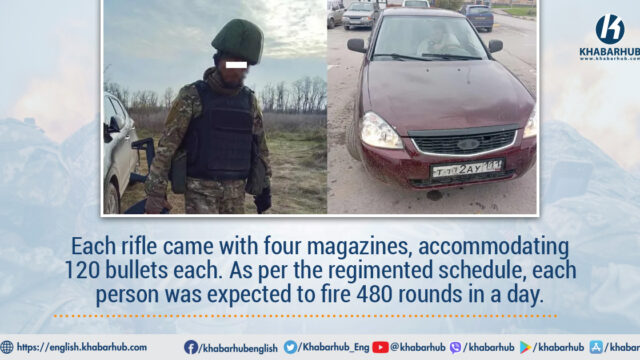
As the world grapples with the unfolding drama in Ukraine, Mr. Chhetri’s testimony serves as a stark reminder of the complex web of alliances and betrayals that echo across international borders.
Nepal to Moscow: Arrival and Selection Center Experience
After a journey on a ship, we arrived in Moscow where our passports and mobile phones were confiscated during airport checks. With the guidance of Nepali broker Manoj Kumar Joshi, known as Sobharaj, immigration procedures were smoothly navigated, and we were ushered into Moscow.
Upon reaching the hotel, we awaited the morning, and soon we were transported to the ‘Selection Centre’ for approximately an hour.
Notably, there were no Nepali brokers present at the Selection Centre; we were handed over directly to the Russians.
An interpretor facilitated communication from Russian to English, and the Russians collected our resumes, arranged for mobile phone sims, and assisted in opening bank accounts.
Medical examinations ensued, with eligibility for the Russian army contingent upon being free of HIV and TB.
Rumors circulated about a team member being sent back due to an HIV-positive status, but our medical reports were deemed satisfactory.
The subsequent day led us to an army school, where we resided for 19 days.
During this period, tactical battle positions, weapon use, drone operations, and medical procedures were diligently taught.
An English translator aided language comprehension. Despite inquiries, the Russians refrained from showing scenes of defeat in their war displays.
Contract Signing and Deployment to Rostov
While at the army school, we were compelled to sign contracts, sealing our commitment.
Despite attempts to avoid the agreement, citing family problems, the outcome was inevitable.
Following the contract signing, we were transported overnight on a 16-hour bus journey to the war zone near Ukraine, specifically to Rostov on the Black Sea.
Rostov presented challenging conditions—muddy and wet, with unpredictable weather alternating between sunny and rainy days.
Despite being relatively less cold than Moscow, the environment in Rostov required adaptability.
Training to Fire: AK-12 Rifle and Intensive Practice
The next morning marked our immediate induction to the firing line, armed with AK-12 rifles—a derivative of the AK-47.
Each rifle came with four magazines, accommodating 120 bullets each. As per the regimented schedule, each person was expected to fire 480 rounds in a day.
Instruction involved variations in shooting techniques, from single shots to double shots and bursts.
Our initial day in the trench involved relentless firing, emphasizing both accuracy and comfort in handling the weapons.
Left hand, right hand—precise targeting and executing commands ensured a rigorous training regimen.
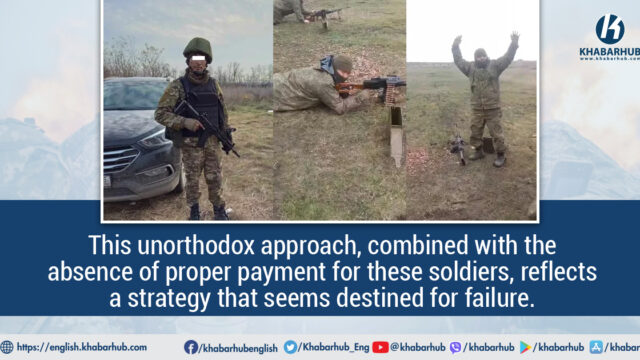
The imperative was to continue firing until the ammunition was depleted. Those unable to complete the task were replaced by others, highlighting the stringent nature of the training process, which included the use of brushes for maintenance.
In the Firing Line: A Glimpse into My Experience
I am an individual acquainted with the intricacies of firing. Amidst our group of Nepali recruits, some displayed visible trepidation. Kamer, one of our comrades, demonstrated an unsettling propensity for shooting at fellow enlistees. Those who had prior experience took control of the situation, ensuring order.
On the second day, the training expanded to encompass medical procedures, ranging from basic RL (Rifleman) tasks to sniper techniques.
Technical intricacies and movement-related skills were meticulously taught, covering a spectrum of weapons, including tank firing.
The firing sessions were intense. Initially, a small percentage appeared content, but as comprehension deepened, a collective desire to return to Nepal became palpable.
Should the government initiate the process, many are willing to make the journey back home, realizing that the financial investment has been made, and it is now time to return.
Among our diverse group, individuals of Nepalese origin who had served in the Indian Army were present.
An Indian-origin individual in our cohort seemed content, as did a Chinese recruit who had joined the Russian Army after a significant monetary investment by his partner.
Additionally, participants from Turkmenistan and Kazakhstan reflected the mosaic of neighboring countries contributing to the Russian Army.
Challenges Beyond the Firing Line: Living Conditions and Food Woes
The stay in Rostov presented significant challenges, particularly in terms of sustenance. The food quality was notably poor, consisting mostly of raw wheat.
According to Mr. Chhetri, timeliness was a concern, as delays often meant no food.
Nepalis observed Russians finishing their meals and leaving, often without any provisions for them, according to him.
Mr. Chhetri further shares: Hunger became a stark reality for us Nepalis on one unfortunate day. Our options for leaving the premises were limited, and the distance was considerable.
Even when we managed to procure noodles, the predominant choice, it often featured beef. Securing chicken was a complex endeavor, but if found, it brought a measure of satisfaction, providing a reprieve from the monotony of our meals.
There were days when we retired to sleep with only bread as our sustenance. The quality of Pooroti, a staple, was so subpar that it rivaled even the most basic options.
The first camp provided a relatively organized and comfortable stay with proper hostel facilities.
However, the second camp, set in a tent near the sea, was challenging. Navigating the muddy terrain required gumboots, and the relentless rain and wind disrupted daily routines. Eating became a struggle, and the conditions seemed perilous.
Our time in the camp spanned 11 days, confined to the green zone of the war zone, with the yellow and red zones representing potential future challenges, particularly as the prospect of transitioning to the attack position loomed—a critical juncture in our training.
Foiled Escape Attempts
Our Indian friend, stationed ahead of us, played a crucial role in providing information that facilitated our escape plan.
However, the moment our intentions became known, the passport, our lifeline for the escape, was confiscated, leading to his imprisonment.
Until that day of escape, the passport remained in our possession, marking an unprecedented record.
One evening, after our return from firing, we hatched a secret escape plan.
Seeking aid from four or five Nepali brokers in Moscow, we implored, ‘As fellow Nepalis, help us escape this predicament. We are in dire straits and will offer whatever funds are needed.’
Their demand was $1200 per person, but after negotiations, we settled at $700 per person.
Despite the agreement, the promised escape car failed to materialize at 2 am, plunging our morale into despair.
The Second Plan Unveiled
Determined to escape the dire situation, I pondered the vast plains of Rostov, encompassing the entire army area.
The challenge was daunting, with a muddy terrain spanning 18 km. Evading the army on foot was perilous, as capture could result in imprisonment as a fugitive. The stakes were high, and a careful strategy was imperative.
Two of us, feigning sickness, abstained from firing the next day and availed ourselves of leave.
In the afternoon, we seized an opportunity to meet with a Russian woman overseeing the canteen.
Observing a security lapse in the army’s operation of opening the gate for deliveries from Rostov Supermarket, we recognized a potential escape route.
Convincing the Russian woman that one of our brothers urgently needed to leave, we capitalized on the situation.
By 11 o’clock that night, two of us successfully executed our escape plan, making our way from the camp to Rostov Super Market.
A Daring Escape: Journey to Moscow
On that eventful day, while our fellow friends were engaged in night firing, we found ourselves contemplating an escape plan.
The anti-tank bomb in our possession was a stark reminder that such weaponry belonged with the army in Nepal, not within the precincts of the police force.
Returning to the camp from firing at 2 pm, our team was ushered to a meal break.
However, three of us opted to remain on standby, clad in civilian attire beneath our uniforms.
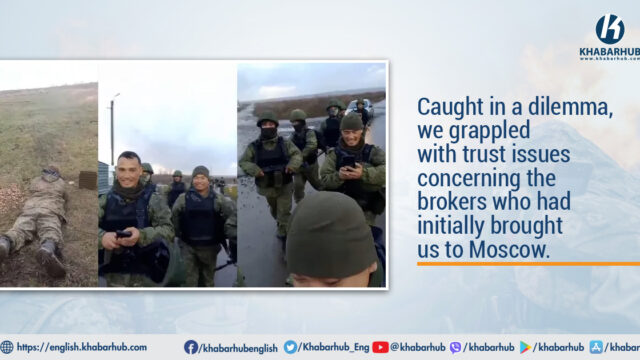
A signal eventually beckoned us for night firing once again, possibly in response to the awareness of our earlier departure.
Around four o’clock, seizing an opportune moment, three of us, including myself, managed to board a taxi transporting goods. In a team of five, we embarked on a journey from Rostov Supermarket to Moscow.
Yet, challenges surfaced as taxi regulations permitted no more than three passengers.
Negotiating a fare, we encountered varying demands, ranging from 55 thousand to 70 thousand rubles.
After persistent bargaining, at 7:30 pm, having paid an increased amount, all five of us departed from Rostov Supermarket bound for Moscow.
A Nepali broker from Moscow promptly provided me with 30,000 rubles on the spot.
Convinced of the danger we faced, he deposited the funds into my account. Carrying a total of 3,000 rubles, we embarked on our journey to Moscow in the taxi.
The journey, lasting approximately 12-13 hours, proceeded at a speed of 180 km per hour.
Cross-checks at seven checkpoints were navigated smoothly with our passports, as we were not involved in criminal activities.
We maintained cordial relations with the taxi driver, offering him coffee, lunch, and a delightful Solma with chicken in bread, a sweet delicacy.
The journey proved a harmonious experience, and despite the driver’s probable awareness of our escape, he did not express it, hindered by the language barrier.
Rescue Operation on the Road
En route to Moscow, we seized an opportunity to facilitate the escape of another group.
Coordinating with the taxi driver, we provided him with sums of 2500, 3000, and 4000 rubles at different instances to fetch our friends from the camp.
The transporter’s vehicle, laden with goods, expedited the process at the army checkpoints.
This coordination marked a significant incident. Another group, including my brother, a Nepali working in the Indian Army, successfully arrived at Rostov Supermarket in the third lot.
After night firing, they surrendered their guns, a symbolic gesture that we also replicated.
However, their efforts to secure a taxi were initially unsuccessful, delaying their departure until 9:30 pm.
The concerned taxi driver kept us informed, demonstrating remarkable patience.
A roll call scheduled for 9 o’clock that night was conspicuously omitted, possibly a strategic move in response to the suspected escape.
Subsequently, we learned that the Russian army, alerted to the escape of eight Nepalis, confiscated passports of others. In our absence, the friends left behind faced considerable challenges, emphasizing the complexities of our daring escape.
Unraveling the Challenges in Moscow
Three friends, including my brother, ventured out to the supermarket overnight in pursuit of a taxi to Moscow, only to encounter the bitter reality of scarcity.
Stranded in the biting cold, the fear of potential fatalities loomed large. The looming threat of police confiscation added to their dilemma, given the distinct color and language barriers.
Facing adversity, they sought refuge in a hotel for the night. A sympathetic taxi driver, who had previously transported us to Moscow, came to their aid.
A phone call to the hotelier facilitated their stay. However, the predicament persisted; they neither secured a taxi nor could they depart the hotel.
Upon our intervention, the taxi driver orchestrated a move to a known hotel at three o’clock in the night, a transaction for which we paid 10,000.
The following morning, the trio managed to book a taxi for 55,000 and eventually reached Moscow. Unbeknownst to us, another trap awaited us in the capital.
Navigating Another Snare in Moscow
In Moscow, we found ourselves ensnared by Nepali brokers who painted a tempting picture—offering to send us to Albania on a visit visa with promises of earning 600 euros per month in Greece or a potential journey to Germany.
The allure masked their ulterior motive of extorting money from us once again.
Caught in a dilemma, we grappled with trust issues concerning the brokers who had initially brought us to Moscow.
Dividing into two groups, one sought insights into the German proposition while the other delved into the Greek option.
The group exploring Germany faced adversity, encountering police during a social gathering.
Advised to flee as the hotel was under surveillance, our group remained unscathed.
Remaining in Moscow for a week, the realization dawned upon us that succumbing to such traps was untenable.
The fear of potential entanglements, be it with local police or a return to Rostov, loomed large.
Drawing on my experience as a former police officer, I harbored suspicions that propelled the decision to return home, resolved not to fall prey to external manipulations.
Exploitation Among Nepalis in Moscow
Our time in Moscow was marred by the distressing experiences we encountered at the hands of fellow Nepalis.
Saturdays proved particularly challenging for financial transactions from Nepal, and rumors circulated about brokers holding numerous Nepalis hostage under the guise of facilitating journeys to Greece and Germany.
The crisis reached a peak when, around 11 o’clock at night (2 o’clock in Nepal), the brokers arrived at the hotel where my brother and I were staying.
Fearing imminent danger, we hastily shifted to another hotel, compelled to pay an additional fine of 1000. Sleep eluded us that night.
The three Indian friends, managing to book tickets in the night, flew to Air Arabia at 2 am.
Meanwhile, my brother and I, lodged in the second hotel near the airport, grappled with heightened fear and diminishing morale.
At 3 o’clock in the night, the brokers returned, knocking on our door, and my consciousness wavered.
Amidst this turmoil, the police appeared, and, resigned to whatever fate awaited, I opened the door.
The brokers persisted, aiming to transport Nepalis while extorting money. Brandishing passports of eight non-compliant individuals, they issued threats of dire consequences.
Faced with a potential clash, I pleaded with the broker, appealing to our shared Nepali identity.
Expressing the urgency of our situation and the desire to return safely to Nepal, I proposed a financial arrangement once funds became available on Sunday.
To secure our immediate safety, I reluctantly handed over 15,000 rubles, well beyond the initial demand of 4900.
Left alone in the hotel, my brother and I grappled with the weight of our decision. With no prior experience, we debated the course of action.
The night unfolded in restlessness, exacerbated by the discomfort of relying on a broker whose credibility was in question.
Having a friend in a Nepali consultancy, I reached out for assistance. Despite the late hour, he procured two tickets, urging us to return to Nepal and arrange the money there.
In a strategic move, we booked a hotel for three days without notifying the brokers, seizing an opportunity when they were unaware.
Under the cover of morning and night, we made our escape. Upon exiting the hotel, we encountered a worker clearing ice from the road.
Communicating in Russian, we managed to convey our need for a taxi to the airport.
The taxi, as indicated in the ice-written message, arrived, and within 25/30 minutes, we found solace behind the airport gates.
Got a New Life
Upon entering the airport, we proceeded to obtain our boarding passes for Air Arabia.
However, our journey faced a hurdle at immigration, where our passports were confiscated, and we were asked to sit.
Despite the apprehension, we endured a 15-minute wait until an employee returned with our passports.
Observing the scrutiny of passports and individuals, it felt as though we were on the verge of being caught.
Nevertheless, our genuine passports were handed back to us, marking a pivotal moment for our survival. Subsequently, we successfully returned to Nepal via Sharjah transit.
Once in Sharjah, I contacted the Nepali broker in Moscow, expressing my discontent.
I confronted him about his empty boasts of hunting elephants and stated that, had I stayed in Moscow as long as he had, I would have sold his pieces and departed.
Demanding the return of my money, he reluctantly agreed, promising to send 10,000 after providing an Indian account number.
Thus, this audacious character returned to his homeland after being saved by fellow Nepalis.
I implore everyone to refrain from traveling to Russia, and I urge the government to intervene.
Those Nepalis already present should be repatriated, and any further departures halted.
Obtaining tourist visas from Russian embassies may seem easy, but it becomes a trap when signed contracts are involved.
The Nepali government needs to put an end to this, considering the alarming rate at which individuals who go there fail to return.
While assessing the dire conditions, I had little hope of returning alive. I was not alone; others, too, shared similar sentiments.
Many Nepalis, approximately 7 from our group alone, have been recruited into the Russian Army, with casualties reaching one and a half to two hundred.
The Rostov camp, where we were stationed, initially housed two and a half hundred Nepalese, but by the time of our escape, only 80 remained.
From our initial group of 8 who journeyed from Kathmandu, we grew to 26 by the time we reached the camp, incorporating additional members along the way.
The situation was dire, and numerous Nepalis had faced the harsh consequences of their decisions.
Salary Discrepancy and Financial Struggles
When it came to discussing our salaries, the manpower broker assured us a monthly payment of 195,000 rubles.
However, to our dismay, the actual salary turned out to be a mere 34 thousand rubles, equivalent to about 50 thousand Nepalese rupees.
Facing financial constraints, we resorted to borrowing 400 dollars from home, which incurred additional commission fees.
In Nepal, where the market rate for 100 dollars is 13,000, brokers exploit individuals by offering a rate as low as 7,000.
The Nepali community in Russia endures substantial hardships due to these financial imbalances.
The absence of a direct money transfer mechanism between Russia and Nepal exacerbates the problem.
Money is often withdrawn, converted through brokers, and then transferred to relatives in Nepal, with brokers taking hefty commissions at each step.
It’s impractical that opening a bank account in Russia doesn’t provide a direct means of sending money to Nepal.
Instead, a convoluted process involving commissions is followed. The money is first sent to India, and then onward to Nepal.
The prevalence of Nepali brokers in Moscow, engaged in questionable practices, is disheartening.
Individuals like Manoj Kumar Joshi, known as Sobharaj, and Anup Danuwar, who initially went to study in Russia, are now involved in brokering and questionable activities.
The existence of brokers like ‘Alam Sir,’ known for smuggling elephants from Nepal to Russia, is an unfortunate reality.
Forced Into a Predicament
The desperation for financial stability, coupled with personal responsibilities, compelled me to join the Russian army, despite my knowledge of the military.
With one son and one daughter, my pension proved insufficient to meet the educational needs of my children. As the eldest son in the family, I felt responsible for my parents, brothers, and sisters.
Driven by the allure of attractive salaries, coupled with the recent shutdown of TikTok in Nepal, I found myself swayed by the enticing prospects presented by the Russian army.
The appeal of stylish uniforms, competitive salaries, and the opportunity to handle the latest weapons, as showcased on TikTok, played a significant role in my decision.
Financial Drain and Disillusionment
The financial burden was substantial, with a total expense of 19 lakh rupees to join the venture.
However, the monthly earnings turned out to be zero, forcing us to buy even basic necessities like water.
The realization that we had invested heavily with no returns heightened our frustration.
During our week-long stay in Moscow, we refrained from contacting the Nepali embassy, fueled by fears of potential collusion between embassy staff and Nepali brokers.
Upon returning to Kathmandu, I reported some brokers to the police, but the response was tepid, highlighting the pervasive influence of brokers who facilitate the smuggling of individuals from the airport with apparent ease.
Overstaying in Moscow and Mercenary Realities
My tourist visa for Moscow lasted 27 days, and during my stay, I overstayed by 13 days.
Russia is known for hosting a significant number of illegal residents, and if one hasn’t committed a criminal act, visa expiration doesn’t typically lead to immediate consequences.
Despite our over stay, we took advantage of our time, exploring Moscow for a week in taxis.
Surprisingly, even individuals who had escaped from the army faced no blacklisting, perhaps due to lax enforcement, possibly influenced by the ongoing war.
Futility of the Attack on Ukraine
Russia’s utilization of prisoners and seemingly unfit individuals in the war against Ukraine has raised serious doubts about the effectiveness of their strategy.
The mandatory army service has led to the inclusion of people with various physical and mental limitations in the conflict.
This unorthodox approach, combined with the absence of proper payment for these soldiers, reflects a strategy that seems destined for failure.
The current tactics involve causing harm and destruction in Ukraine without any clear objective or compensation for the soldiers.
The chance of victory appears minuscule, especially considering Ukraine’s fortified position with advanced weaponry.
While Russia has managed to occupy some territory, Ukraine remains secure within its bunkers.
The lack of morale among mercenaries, including Nepalis, further diminishes the prospect of success.
The living conditions in the training camp in Nepal, where soldiers have to wait a week to take a bath and face issues like lice infestations, contrast sharply with expectations of a modern and well-organized military operation.
Initially, the expectation was that Russia would employ sophisticated weapons and tactics to swiftly overcome Ukraine.
However, the reality on the ground revealed a different story, with inadequate facilities, water scarcity, and poor living conditions.
The overall assessment is that Russia’s attack on Ukraine appears pointless, exhibiting imperialistic tendencies and a lack of strategic necessity.
The situation raises concerns for Nepalis on both sides, as the conflict escalates with advanced weaponry that could endanger lives regardless of their location.


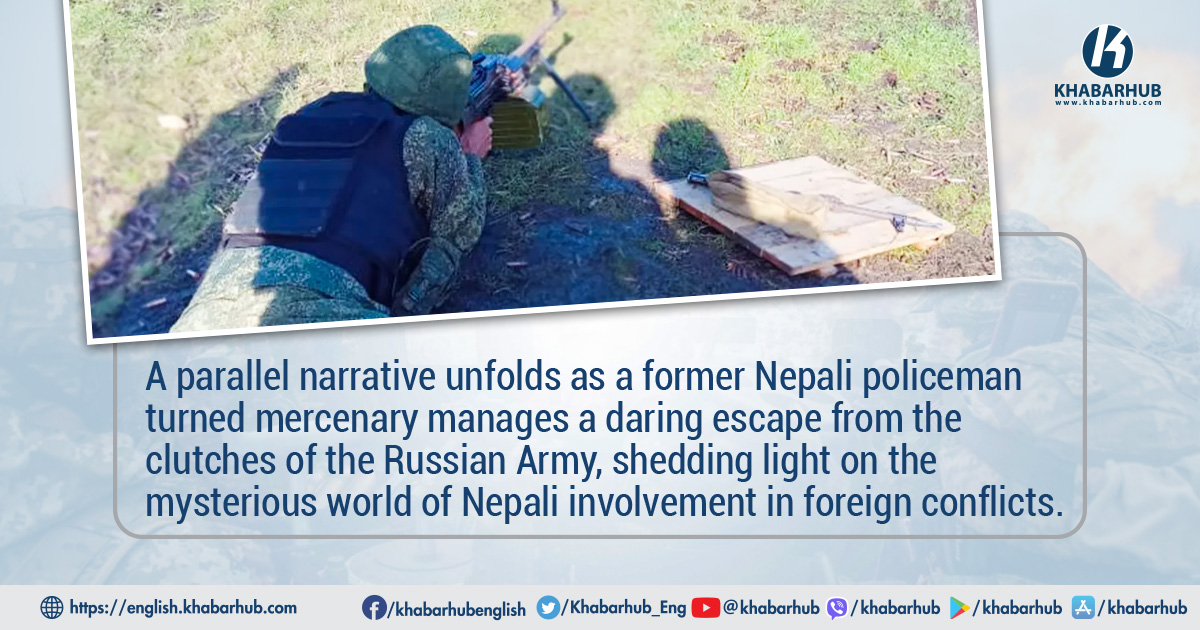

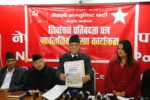

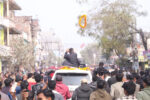


Comment